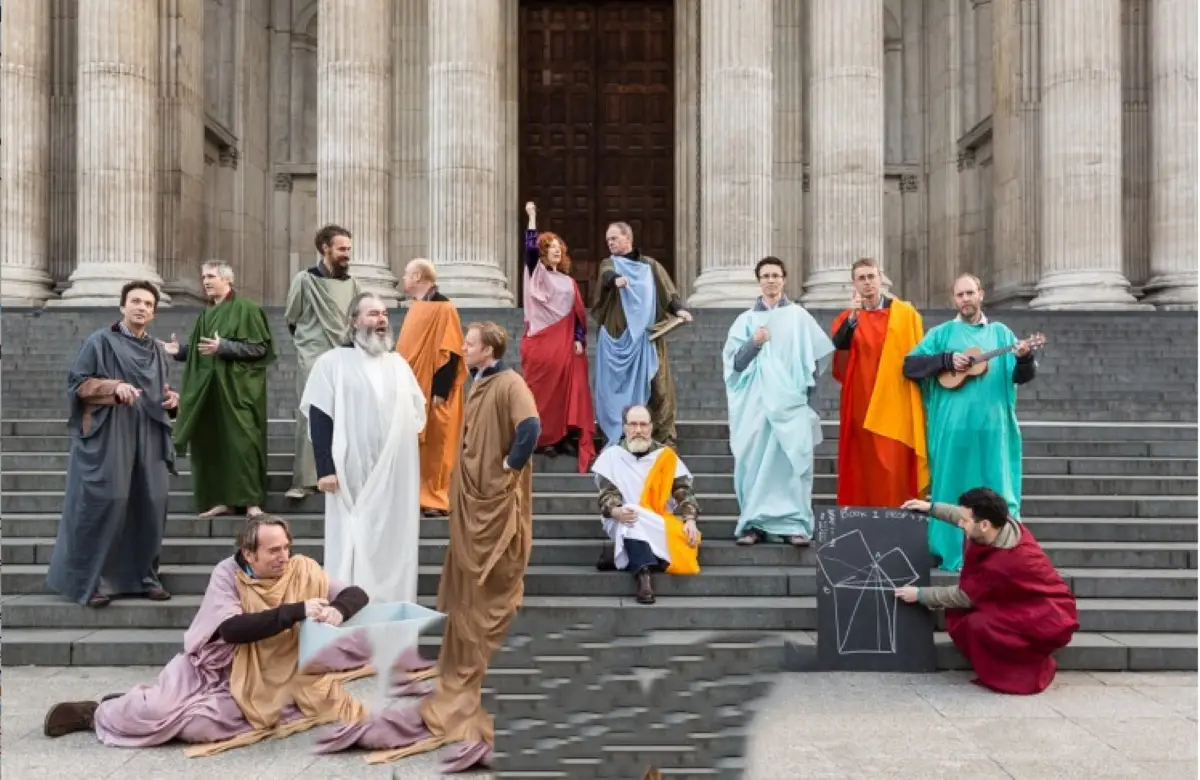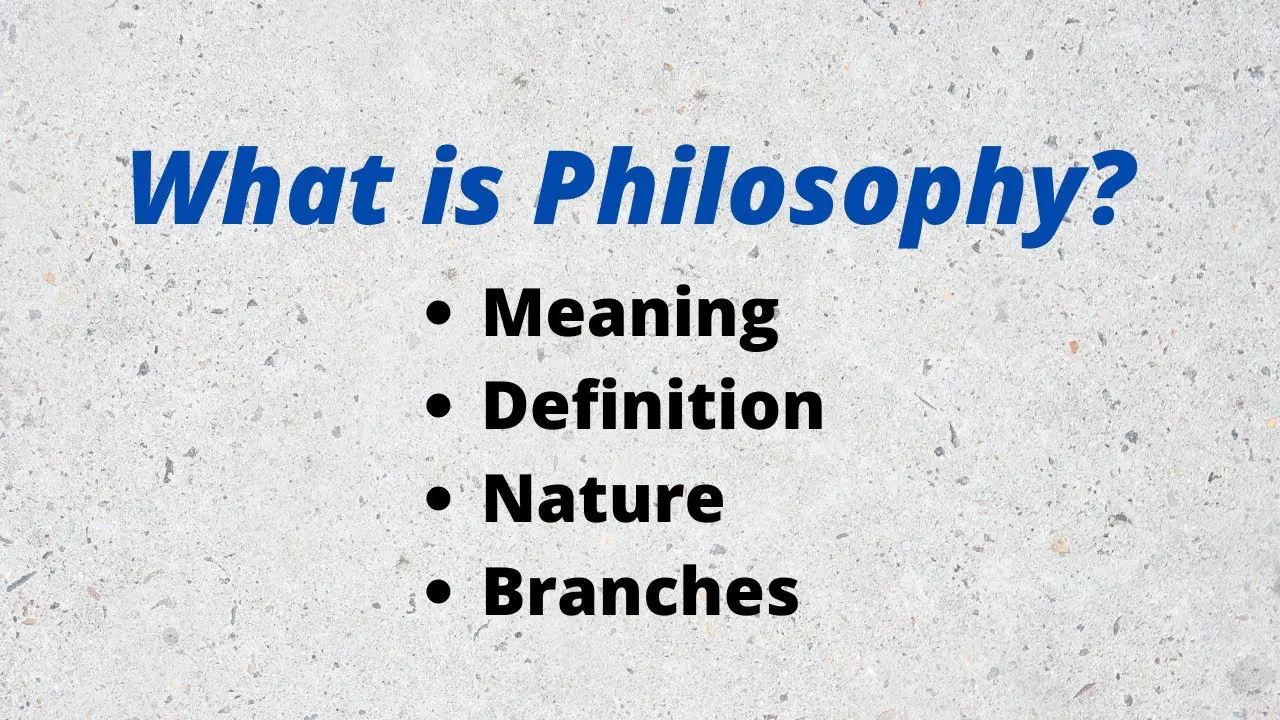What is Philosophy?
Philosophy is a field of study that tries to answer questions about existence, reality, knowledge, right and wrong, and what it means to be human. It tries to figure out what reality is, what life is all about, and what it means to be human.
Philosophy is the systematic examination of ideas and issues, employing rational inquiry and critical analysis to explore fundamental truths about the nature of reality, knowledge, existence, and morality.
One of the central aims of philosophy is to achieve a comprehensive understanding of the world and our place within it. Philosophers delve into metaphysical questions about the ultimate nature of reality, pondering the existence of abstract entities, the structure of the universe, and the relationship between mind and matter. Through metaphysical inquiry, philosophers seek to uncover the underlying principles that govern the cosmos and determine the nature of existence itself.
In addition to metaphysics, philosophy also encompasses epistemology, the study of knowledge. Epistemologists investigate the nature, scope, and limits of human knowledge, examining questions such as: What can we know? How do we know it? What are the criteria for justified belief? By scrutinizing the foundations of knowledge and the methods of inquiry, epistemology aims to elucidate the nature of truth and rationality.
Philosophy is the study of principles of conduct, ethics, and morality. Ethical philosophy explores questions of right and wrong, good and evil, and the principles that govern human behavior. Ethicists analyze moral dilemmas, ethical theories, and the foundations of moral judgment, seeking to develop frameworks for ethical decision-making and the cultivation of virtuous character.
Philosophy encompasses social and political philosophy, which examines the nature of society, justice, freedom, and the role of government. Social philosophers explore questions of social justice, equality, and human rights, while political philosophers analyze different forms of governance, power structures, and systems of justice.
Beyond these core areas, philosophy encompasses a wide range of specialized fields and subdisciplines, including aesthetics (the study of beauty and art), logic (the study of reasoning and argumentation), philosophy of science (the study of the nature and methodology of science), and philosophy of mind (the study of consciousness, cognition, and the nature of mental states).
Philosophy is a multifaceted discipline that encompasses the systematic study of ideas and issues across a broad spectrum of topics. By engaging in philosophical inquiry, individuals gain insight into the fundamental questions that shape our understanding of the world, our values, and our place in the cosmos.

Philosophy studies the most important ideas and concepts that help us understand the world. The study of fundamental questions explores the nature of reality, existence, and knowledge.
Philosophy is an important subject because it gives us a way to think about the world around us in a critical and organized way. It helps us understand the basic rules that govern human life and gives us a way to think about difficult problems and issues. Philosophy also helps us develop our ideas and values and have meaningful conversations with people with different ideas and points of view.
It asks questions about existence, reality, knowledge, right and wrong, and what it means to be human. We will explore philosophy, its origins, and its relevance to education.
Philosophy, often regarded as the pursuit of wisdom and understanding, is a multifaceted discipline that delves into the deepest questions of existence, knowledge, and value. Rooted in ancient Greek intellectual traditions, philosophy encompasses a diverse array of inquiries and approaches aimed at unraveling the mysteries of the human condition and the nature of reality itself. In this essay, we will explore the essence of philosophy, its historical origins, major branches, and enduring relevance in contemporary society.
The term “philosophy” derives from the Greek words “philos,” meaning love, and “sophia,” meaning wisdom, reflecting the discipline’s foundational aspiration to cultivate a deep appreciation for knowledge and truth. At its core, philosophy is characterized by a spirit of inquiry, critical reflection, and intellectual curiosity. It invites us to question the fundamental assumptions underlying our beliefs, examine the nature of reality, and contemplate the meaning and purpose of human existence.
The origins of philosophy can be traced back to ancient Greece, where scholars grappled with profound questions about the nature of the universe, the origins of life, and the principles that govern human conduct. In the pre-Socratic era, thinkers such as Thales, Anaximander, and Heraclitus laid the groundwork for philosophical inquiry by proposing speculative theories about the fundamental elements of reality and the underlying principles of change and motion.
However, it was the renowned philosopher Socrates who revolutionized the field of philosophy by shifting its focus from speculative metaphysics to moral and ethical inquiry. Through his method of dialectical questioning, Socrates sought to stimulate critical thinking and encourage individuals to examine their beliefs and values. His famous dictum, “The unexamined life is not worth living,” underscored the importance of self-reflection and philosophical inquiry in the pursuit of wisdom and self-knowledge.
Following in the footsteps of Socrates, Plato further developed the philosophical tradition, establishing the first formal academy in Athens and laying the groundwork for Western philosophy. Plato’s dialogues, characterized by their Socratic method and exploration of metaphysical and ethical themes, remain foundational texts in the history of philosophy. His student, Aristotle, made significant contributions to the field, pioneering the systematic study of logic, metaphysics, ethics, and politics.
Throughout history, philosophy has evolved and diversified into various branches and schools of thought, each offering distinct perspectives on the nature of reality, knowledge, and value. Metaphysics, the branch of philosophy concerned with the ultimate nature of existence, explores questions about the origins of the universe, the nature of being, and the existence of God. Epistemology, the study of knowledge, examines the nature, scope, and limits of human understanding, addressing questions about the nature of truth, belief, and justification.
Value theory, encompassing ethics and aesthetics, explores questions about morality, beauty, and the nature of the good life. Ethics delves into the principles that govern human conduct, posing questions about moral responsibility, virtue, and the nature of the good. Aesthetics, on the other hand, investigates the nature of beauty and artistic expression, exploring questions about the subjective and objective dimensions of aesthetic experience.
Logic, often considered the foundation of philosophical inquiry, provides the tools and methods for rigorous reasoning and argumentation. By employing logical principles, philosophers analyze and evaluate arguments, identify fallacies, and construct valid and sound lines of reasoning. Logic plays a crucial role in philosophy, facilitating clarity of thought, precision in argumentation, and coherence in philosophical discourse.
Despite its ancient roots, philosophy remains as relevant and essential as ever in contemporary society. In an increasingly complex and interconnected world, philosophical inquiry offers valuable insights into pressing issues and challenges, from ethical dilemmas and social justice to environmental sustainability and technological advancement. By engaging with philosophical questions and perspectives, individuals gain a deeper understanding of themselves, their place in the world, and their responsibilities as moral agents and rational beings.
Philosophy is a rich and diverse discipline that encompasses a wide range of inquiries and approaches aimed at exploring the deepest questions of existence, knowledge, and value. From its origins in ancient Greece to its enduring relevance in contemporary society, philosophy continues to inspire and challenge individuals to think critically, reflect deeply, and seek wisdom and understanding. As we embark on the journey of philosophical inquiry, we discover not only knowledge but also insight, meaning, and profound truths about ourselves and the world we inhabit.
HISTORY OF PHILOSOPHY
Philosophy is a discipline that has been studied and debated for thousands of years. It asks questions about existence, reality, knowledge, right and wrong, and what it means to be human. Here we will look at the history of philosophy, from its beginnings in ancient Greece to how it has changed since then.
The history of philosophy is a rich tapestry of intellectual inquiry, spanning thousands of years and encompassing diverse cultures, traditions, and philosophical movements. From its origins in ancient civilizations to its evolution into a global discipline, the history of philosophy provides insights into the development of human thought, the exploration of fundamental questions, and the quest for wisdom and understanding.
Ancient Philosophy: The origins of philosophy can be traced back to ancient civilizations such as Mesopotamia, Egypt, India, and China, where scholars and sages grappled with profound questions about the nature of existence, the cosmos, and the human condition. In ancient Greece, the birthplace of Western philosophy, thinkers like Thales, Pythagoras, and Heraclitus laid the foundations for philosophical inquiry by proposing speculative theories about the fundamental elements of reality and the principles governing change and motion.
Classical Greek Philosophy: The classical period of Greek philosophy, spanning the 5th and 4th centuries BCE, witnessed the emergence of renowned philosophers who made enduring contributions to the field. Socrates, with his method of dialectical questioning, Plato, with his ideal forms and theory of justice, and Aristotle, with his systematic approach to knowledge and ethics, shaped the trajectory of Western thought and established the foundations of Western philosophy.
Hellenistic and Roman Philosophy: Following the decline of classical Greece, philosophy flourished in the Hellenistic period, as thinkers like Epicurus, Zeno of Citium, and the Stoics explored questions about ethics, happiness, and the nature of the good life. Meanwhile, in ancient Rome, philosophers like Seneca, Epictetus, and Marcus Aurelius continued the Stoic tradition and applied philosophical principles to practical ethics and governance.
Medieval Philosophy: During the Middle Ages, philosophy transformed as Islamic scholars preserved and translated the works of ancient Greek philosophers, transmitting them to the West and sparking a revival of philosophical inquiry. In Europe, figures like Augustine of Hippo, Anselm of Canterbury, and Thomas Aquinas integrated Christian theology with classical philosophy, laying the groundwork for medieval scholasticism and shaping the intellectual landscape of the era.
Renaissance and Early Modern Philosophy: The Renaissance witnessed a revival of interest in classical learning and a resurgence of philosophical inquiry, as humanist scholars like Petrarch and Erasmus explored themes of individualism, humanism, and the nature of knowledge. In the 17th and 18th centuries, the Enlightenment ushered in a new era of philosophical thought, as thinkers like René Descartes, John Locke, and Immanuel Kant challenged traditional authority, embraced reason and empiricism, and laid the groundwork for modern philosophy.
19th and 20th Century Philosophy: The 19th and 20th centuries saw the emergence of diverse philosophical movements and schools of thought, from German idealism and existentialism to pragmatism and analytic philosophy. Figures like Friedrich Nietzsche, Søren Kierkegaard, Jean-Paul Sartre, Ludwig Wittgenstein, and Bertrand Russell revolutionized the field with their groundbreaking ideas and innovative approaches to philosophy.
Contemporary Philosophy: In the contemporary era, philosophy continues to evolve and adapt to the challenges of the modern world, addressing pressing issues such as globalization, technology, environmental ethics, and social justice. Philosophers engage in interdisciplinary dialogue, drawing insights from fields like neuroscience, psychology, economics, and political science to inform their philosophical inquiries and contribute to public discourse.
The history of philosophy is a testament to the enduring human quest for wisdom, understanding, and truth. From ancient civilizations to the present day, philosophers have grappled with fundamental questions about the nature of reality, the limits of knowledge, and the principles that govern human conduct. By studying the history of philosophy, we gain a deeper appreciation for the diversity of human thought and the enduring relevance of philosophical inquiry in our quest for meaning and understanding.
ORIGINS OF PHILOSOPHY
Philosophy began in ancient Greece, where philosophers like Socrates, Plato, and Aristotle asked important questions about reality, knowledge, and existence. These philosophers sought to understand the world around them through reason and observation rather than through myths and legends.
SOCRATES (469–399 BC) is the “father of Western philosophy.” He believed the key to understanding the world was asking questions and engaging in dialogue. His way of asking questions, called the Socratic method, has become one of the most important ways to study philosophy.
PLATO is known for his writings on ethics, politics, and metaphysics. He was a student of Socrates. In “The Republic,” his most famous book, he discusses justice and the ideal society. Plato thought we could see a world of eternal, unchanging forms beyond the physical world.
ARISTOTLE was also one of Plato’s students; his writings on logic, ethics, and metaphysics are well known. He believed the natural world could be understood through observation and empirical evidence. Aristotle’s work on logic greatly affected Western thought and still affects how logic is studied today.
MEDIEVAL PHILOSOPHY
Christian theologians like Augustine of Hippo and Thomas Aquinas wrote the most important philosophical works during the Middle Ages. These philosophers tried to find a middle ground between what the Bible says and what philosophers like Aristotle said.
Augustine (354–430 AD) wrote much about religion and God. He believed that God was the source of all knowledge and that human reason was limited. Augustine’s work has had a big effect on Christian theology and has helped shape the way Western thought has developed.
Thomas Aquinas, who lived from 1225–1274 AD, is known for his synthesis of Christian theology and Aristotelian philosophy. He believed that reason and faith were compatible and that reason could be used to understand the natural world. The work of Aquinas has had a big effect on Christian theology, and it still affects the study of philosophy today.
RENAISSANCE AND ENLIGHTENMENT PHILOSOPHY
In the Renaissance and Enlightenment periods, philosophy began to break away from the dominance of Christian theology. Philosophers like René Descartes and Immanuel Kant tried to answer basic questions about reality, knowledge, and existence by using reason and evidence.
Descartes (1596–1650 AD) is known for his famous statement “Cogito, ergo sum” (I think, therefore I am). He believed that the only thing we could be certain of was our existence and that knowledge could be gained through reason and deduction.
Kant (1724–1804) is known for his ethics, metaphysics, and epistemology writings. He thought that what we know is limited by what we see and that reality depends on how we see it. Kant’s work has greatly affected philosophy and how ethics and metaphysics are studied today.
MODERN PHILOSOPHY
In modern times, philosophy has continued to develop and expand. Philosophers such as Friedrich Nietzsche and Jean-Paul Sartre have explored fundamental questions about the nature of existence, reality, and human consciousness.
Nietzsche, who lived in AD, is known for his critiques of traditional morality and his concept of the “Übermensch,” a higher human being who can transcend traditional morality and create their values. Philosophy has greatly changed because of Nietzsche’s work, especially in ethics and existentialism.
Sartre (1905–1980 AD) is known for his existentialist philosophy, which emphasizes individuals’ freedom and responsibility to create meaning and purpose in life. He believed that existence precedes essence, meaning that humans are not born with a predetermined nature or essence but create their essence through their choices and actions.
To summarise the history of philosophy, it has a long, varied, and rich past that goes back thousands of years. From the ancient Greeks to today, philosophers have tried to answer some of the most important questions about existence, reality, knowledge, ethics, and what it means to be human. Philosophy has been shaped by the cultural, social, and historical situations in which it has grown, and it continues to change and grow as the world around us changes. By learning about the history of philosophy, we can learn more about the ideas and concepts that have shaped our world and still affect the way we think today.
BRANCHES OF PHILOSOPHY
There are many branches of philosophy, but we will study the most important of them, which are
- EPISTEMOLOGY
- METAPHYSICS
- AXIOLOGY
WHAT IS EPISTEMOLOGY?
Epistemology is the part of philosophy that examines how and where we can know things. It explores questions such as:
- What is knowledge?
- How do we acquire knowledge?
- What are the limits of knowledge?
Epistemologists seek to understand the nature of knowledge and the processes by which we know things.
Epistemology is a branch of philosophy concerned with the nature and limits of knowledge. Empiricism, rationalism, skepticism, and social epistemology are just a few of the many branches of epistemology.
By understanding the different branches of epistemology, teachers can better design educational experiences that promote critical thinking, inquiry, and a deeper understanding of the material.
Epistemology is also important in education because it can help students develop a more sophisticated understanding of the material and a deeper appreciation for the complexity of knowledge and understanding.
Epistemology is a branch of philosophy that deals with the nature and limits of knowledge. Teachers need to understand epistemology, as it can help them design educational experiences that promote critical thinking and a deeper understanding of the material.
Social Epistemology
Social epistemology is a branch of epistemology that examines the social and cultural factors that influence the acquisition and dissemination of knowledge. It explores questions such as:
- How does social context influence how we acquire and evaluate knowledge?
- How do social factors such as gender, race, and class influence the distribution of knowledge?
Social epistemologists seek to understand the role of social and cultural factors in shaping our beliefs and the way we evaluate knowledge claims.
Importance of Epistemology in Education
Epistemology is an important area of study for educators because it informs our understanding of how students learn and how knowledge is acquired.
By understanding the different branches of epistemology, teachers can better design educational experiences that promote critical thinking, inquiry, and a deeper understanding of the material.
For example, teachers who understand empiricism may design lessons emphasizing hands-on experimentation and observation. In contrast, teachers who understand rationalism may create lessons that emphasize logical reasoning and using a priori principles.
Teachers who understand skepticism may encourage students to question knowledge claims and seek evidence to support them.
Epistemology is also important in education because it can help students develop a more sophisticated understanding of the material.
By examining how knowledge is acquired and evaluated, students can learn to approach the material more critically and develop a deeper appreciation for the complexity of knowledge and understanding.
Understanding Epistemology
Epistemology is concerned with how knowledge is acquired, evaluated, and justified. It explores questions such as:
- What is knowledge?
- How do we acquire knowledge?
- What are the limits of knowledge?
Teachers who understand epistemology can use this knowledge to design educational experiences that promote critical thinking and a deeper understanding of the material.
Teachers who understand the principles of empiricism may design lessons that emphasize hands-on experimentation and observation. In contrast, teachers who understand rationalism may design lessons that emphasize logical reasoning and using a priori principles. Teachers who understand skepticism may encourage students to question knowledge claims and seek evidence to support them.
Using Epistemology to Understand Students
Teachers can also use epistemology to understand better their students and how they approach the material.
Some students may have a more empirical approach to learning, preferring hands-on experimentation and observation. Other students may have a more rationalistic approach, preferring logical reasoning and using a priori principles.
By understanding the epistemological approach of their students, teachers can design educational experiences that cater to their learning styles. It can help students engage more deeply with the material and improve their understanding of the subject matter.
In addition, teachers can use epistemology to help students develop a more sophisticated understanding of the material. By examining how knowledge is acquired and evaluated, students can learn to approach the material more critically and develop a deeper appreciation for the complexity of knowledge and understanding.
Epistemology for Improvement in the Teaching-Learning Process
Epistemology can also be used to improve the teaching-learning process. By designing educational experiences that promote critical thinking and inquiry, teachers can help students develop a deeper understanding of the material. Teachers can also encourage students to question knowledge claims and seek evidence to support them.
Teachers can use epistemology to promote a more collaborative learning environment. By encouraging students to work together to evaluate and justify knowledge claims, teachers can help students develop a more sophisticated understanding of the material and improve their ability to work effectively in groups.
METAPHYSICS
Metaphysics is the branch of philosophy concerned with the nature of reality. It explores questions such as:
- What is the nature of existence?
- What is the relationship between mind and body?
- What is the relationship between substance and property?
Metaphysicians try to figure out reality and the basic rules that make it work. Metaphysics is a branch of philosophy that tries to understand reality’s nature and its basic rules. It seeks to understand the underlying nature of the universe and the relationships between mind and matter, existence and identity, and causation and change.
Within the broader field of metaphysics, several main branches of study exist. However, we will discuss the following three branches:
- ONTOLOGY
- COSMOLOGY
- PHILOSOPHICAL THEOLOGY
ONTOLOGY
Ontology is the branch of metaphysics that focuses on studying being and existence. It seeks to understand the nature of existence, what kinds of things exist, and what properties are essential to those things.
COSMOLOGY
Cosmology is another important branch of metaphysics that studies the universe. It tries to figure out where the universe came from, how it was built, how it changed over time, and it is basic rules.
PHILOSOPHICAL THEOLOGY
Philosophical theology is also considered a branch of metaphysics. It tries to figure out what God is like by asking questions about God’s existence and nature, God’s relationship to the world, and the nature of religious experience.
Most of the beliefs and theories in metaphysics have been derived from It tries to figure out what God is like by asking questions about God’s existence and nature, God’s relationship to the world, the nature of religious experience, the relationship between mind and matter, and the concept of causation.
EMPIRICISM
Empiricism is a branch of epistemology that emphasizes the role of experience and observation in acquiring knowledge. Empiricists believe that knowledge is derived from sensory experiences and that all knowledge comes from experience. They also believe that knowledge can be improved through scientific observation and experimentation.
RATIONALISM
Rationalism is a branch of epistemology that emphasizes the role of reason and intuition in acquiring knowledge. Rationalists believe that knowledge is innate and that reason and intuition are the primary sources of knowledge. They also believe that knowledge can be improved through the use of logical reasoning and the application of a priori principles.
SCEPTICISM
Skepticism is a branch of epistemology emphasizing the need to critically examine knowledge claims. Skeptics question the reliability of knowledge claims and seek to verify them through empirical evidence and rational argumentation. They also believe knowledge is subject to revision based on new evidence and argumentation.
AXIOLOGY
Axiology is a branch of philosophy that deals with moral values and aesthetics. In education, axiology focuses on the values emphasized in teaching-learning. These values include respect, responsibility, honesty, empathy, and a love of learning.
IMPORTANCE OF AXIOLOGY IN THE TEACHING-LEARNING PROCESS
Axiology is important in the teaching-learning process for several reasons.
Development of Character:
Teachers can help students develop positive character traits by emphasizing positive values in the classroom. It can help students become responsible, empathetic, and respectful members of society.
Motivation
When students understand the value of their learning, they are more motivated to learn. For example, if students understand the value of learning math, they may be more motivated to study and practice math problems.
Positive Learning Environment
Emphasizing positive values in the classroom can help create a positive learning environment. When students feel respected and valued, they are likelier to engage in the learning process and participate in class activities.
Preparation for Life
By emphasizing values such as responsibility, honesty, and respect, teachers can help prepare students for life beyond the classroom. These values are important in all aspects of life, including relationships, careers, and personal growth.
How to Incorporate Axiology in the Teaching-Learning Process?
Here are some ways that teachers can incorporate axiology in the teaching-learning process:
Model Positive Values
Teachers can model positive values such as respect, responsibility, and empathy. When students see these values in action, they are more likely to adopt them.
Emphasize the Value of Learning
Teachers can help students understand the value of their learning by connecting classroom activities to real-world applications. For example, a science teacher might explain how understanding the properties of water can help students understand climate change.
Encourage Critical Thinking
Teachers can encourage critical thinking by asking students to consider the values underlying different perspectives on an issue. For example, a social studies teacher might ask students to consider the different values underlying different political ideologies.
Provide Opportunities for Reflection
Teachers can provide opportunities for students to reflect on their values and how they relate to their learning. For example, a language arts teacher might ask students to write about a time when they learned something that changed their values.
Axiology is an important aspect of the teaching-learning process. Teachers can help students develop positive character traits, motivation, and a love of learning by emphasizing positive values such as respect, responsibility, and empathy. Incorporating axiology into the teaching-learning process can help create a positive learning environment and prepare students for life beyond the classroom.
We will summarize the above article as following
Philosophy is a discipline that attempts to understand the world and our place in it by using critical thinking and reason. It can be divided into various branches, each addressing specific aspects of human existence. Here are the main branches of philosophy:
Epistemology: This branch of philosophy concerns the nature, sources, and limits of knowledge. It explores questions like “What is knowledge?” “How do we acquire knowledge?” “What can we know for certain?” “What are the limits of knowledge?”
Classroom Example: A teacher can use various methods to help students acquire knowledge and develop critical thinking skills. Encouraging them to ask questions, analyze information, and evaluate sources can help students become more confident and capable learners.
Metaphysics: This branch of philosophy examines the nature of reality, existence, and the universe. It raises questions like “What is the nature of reality?” “What is the relationship between mind and body?” “Is the universe eternal, or did it have a beginning?” “What is the meaning of life?”
Classroom Example: A teacher can encourage students to reflect on their beliefs and values, helping them to develop a deeper understanding of their place in the world. Exploring the concepts of reality and existence can help students question their assumptions and develop a more nuanced view of the world.
Axiology: This branch of philosophy is concerned with values, including ethics, aesthetics, and logic. Ethics explores questions like “What is right and wrong?” “What is the meaning of justice?” “What is the purpose of moral reasoning?” Aesthetics examines questions like “What is beauty?” “What is the role of art?” Logic studies truth and reasoning, exploring questions like “What are the principles of valid reasoning?” “What is the nature of truth?”
Classroom Example: Teachers can use literature, art, and music to explore ethical and aesthetic questions with their students. Examining how people have sought to answer these questions throughout history can help students develop a deeper understanding of the world and their place in it.
Philosophy of Science: This branch of philosophy examines the nature of scientific inquiry and the relationship between science and society. It explores questions like “What is the nature of scientific explanation?” “What is the role of values in science?” “What is the relationship between science and society?”
Classroom Example: A science teacher can encourage students to explore the philosophical implications of scientific discoveries. By encouraging them to question assumptions, evaluate evidence, and think critically about the scientific method, they can help students develop a deeper understanding of the scientific process.
Philosophy of Social Science: This branch of philosophy examines the social sciences, including education, economics, politics, and history. It explores questions like “What is the nature of social processes?” “What is the role of history in shaping society?” “What is the purpose of education?
Classroom Example: A social studies teacher can encourage students to explore the philosophical implications of social and historical events. Examining social and economic factors’ role in shaping our lives can help students develop a more nuanced understanding of society and its institutions.
Semantics: This branch of philosophy concerns the meanings of words and language. It explores questions like “What is the relationship between language and reality?” “How do we use language to communicate meaning?
Classroom Example: An English teacher can encourage students to examine the meanings of words and their use in literature. Exploring how authors use language to convey meaning can help students develop a deeper understanding of the power of words and their role in shaping our world.
Relevance of Philosophy to Education
Philosophy has played an important role in shaping education throughout history. Philosophers have explored fundamental questions about the purpose and nature of education. Education is not simply about acquiring knowledge and skills, but also about cultivating critical thinking, moral development, and personal growth. Philosophical inquiries into education have helped to guide curriculum development, teaching methods, and educational policies. By engaging with philosophical ideas, educators can better understand the underlying principles that inform their practice and make more informed decisions about how to best educate future generations. In this way, philosophy continues to be a valuable resource for shaping the future of education.
Some key questions philosophers have asked include
- What is the purpose of education?
- What should be the content of education?
These questions have helped shape education’s goals, objectives, theory, and practice. In contemporary education, philosophy continues to play an important role. Philosophical ideas help teachers and educators figure out how to teach and how to make policies and plans for education.
Pragmatism has greatly impacted American education, for example, by making it more important to learn by doing and solve problems.
Philosophy is a discipline that has been around for centuries and is relevant in modern times. It asks questions about existence, reality, knowledge, right and wrong, and what it means to be human.








[…] Some philosophies and psychological theories are listed below, along with how these are aligned with the demonstration method. […]
[…] Philosophy states that teachers must impart to their students’ everlasting concepts and principles that […]